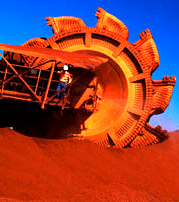Rio boss says iron will stay strong for some
 Rio Tinto’s iron ore boss Andrew Harding says the commodity will stay strong, but high-cost producers will not last long in the current market.
Rio Tinto’s iron ore boss Andrew Harding says the commodity will stay strong, but high-cost producers will not last long in the current market.
Harding says that while demand growth for iron ore has slowed, the long-term outlook is sound.
He said that as long as development and urbanisation of people in China, India, Africa, and South America continues, the need for steel will be there too.
“As developing countries urbanise, and people move from rural to urban ways of life, infrastructure needs change. They build tall apartment blocks and link up the urban areas with roads, railway lines, airports and bridges – all using massive amounts of steel,” Harding told reporters for Rio’s M2M magazine.
“Even though Japan, for instance, has had no to very low growth for a considerable period, it’s still been importing around 130 million tonnes of iron ore every year,.”
But with the iron ore price sitting low and expected to drop further, Harding said being a low-cost producer will keep Rio in the game.
“At Rio Tinto, we can make money on every tonne we sell, and we can indeed sell every tonne. So we will continue to make maximum use of the infrastructure we have installed for our operations,” he said.
He sounded a strong warning to any junior miners that cannot keep their costs down.
“They’re not profitable in the long term, and definitely not through cyclical lows like we’re seeing now,” Harding said.
Rio Tinto has faced harsh criticism over its role in the iron game, with opponents arguing that the giant firm is deliberately flooding the market to keep the iron ore price low, forcing high cost operators out of the market.
Rio plans to produce 330 Mt/a in 2015 and 350 Mt/a in 2017, and Harding says that if it did not go ahead with growing capacity, other companies would, leading to lost revenue for shareholders.
“We can expand because we’re the lowest-cost producer. We make money on every tonne, so why would we choose not to make money?”
“High-cost producers may have entered the market thinking the increase in demand was never going to take a pause, but it has. This has had an immediate impact on price, and whereas they then can’t continue, we can,” he said.
“There is no logic in holding back supply in the hope prices might go up. They might momentarily increase, but we’re not in the business for the moment, we’re in the business for the long term.”








 Print
Print